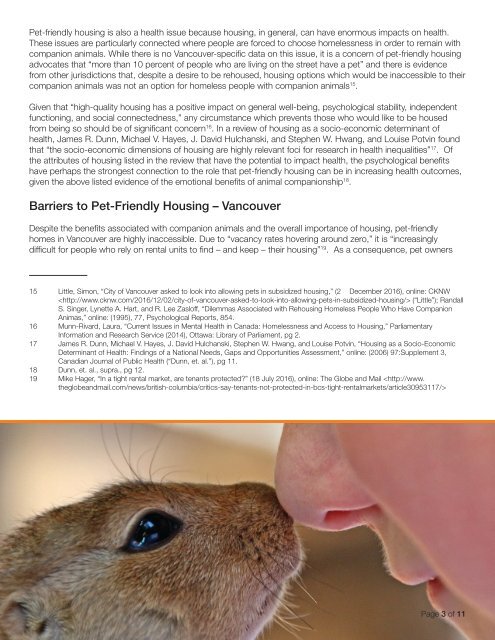You also want an ePaper? Increase the reach of your titles
YUMPU automatically turns print PDFs into web optimized ePapers that Google loves.
Pet-friendly housing is also a health issue because housing, in general, can have enormous impacts on health.<br />
These issues are particularly connected where people are forced to choose homelessness in order to remain with<br />
companion animals. While there is no Vancouver-specific data on this issue, it is a concern of pet-friendly housing<br />
advocates that “more than 10 percent of people who are living on the street have a pet” and there is evidence<br />
from other jurisdictions that, despite a desire to be rehoused, housing options which would be inaccessible to their<br />
companion animals was not an option for homeless people with companion animals 15 .<br />
Given that “high-quality housing has a positive impact on general well-being, psychological stability, independent<br />
functioning, and social connectedness,” any circumstance which prevents those who would like to be housed<br />
from being so should be of significant concern 16 . In a review of housing as a socio-economic determinant of<br />
health, James R. Dunn, Michael V. Hayes, J. David Hulchanski, and Stephen W. Hwang, and Louise Potvin found<br />
that “the socio-economic dimensions of housing are highly relevant foci for research in health inequalities” 17 . Of<br />
the attributes of housing listed in the review that have the potential to impact health, the psychological benefits<br />
have perhaps the strongest connection to the role that pet-friendly housing can be in increasing health outcomes,<br />
given the above listed evidence of the emotional benefits of animal companionship 18 .<br />
Barriers to Pet-Friendly Housing – Vancouver<br />
Despite the benefits associated with companion animals and the overall importance of housing, pet-friendly<br />
homes in Vancouver are highly inaccessible. Due to “vacancy rates hovering around zero,” it is “increasingly<br />
difficult for people who rely on rental units to find – and keep – their housing” 19 . As a consequence, pet owners<br />
face heavy competition when searching for homes and they are often forced to pay higher rents in order to secure<br />
15 Little, Simon, “City of Vancouver asked to look into allowing pets in subsidized housing,” (2 December 2016), online: CKNW<br />
(“Little”); Randall<br />
S. Singer, Lynette A. Hart, and R. Lee Zasloff, “Dilemmas Associated with Rehousing Homeless People Who Have Companion<br />
Animas,” online: (1995), 77, Psychological Reports, 854.<br />
16 Munn-Rivard, Laura, “Current Issues in Mental Health in Canada: Homelessness and Access to Housing,” Parliamentary<br />
Information and Research Service (2014), Ottawa: Library of Parliament, pg 2.<br />
17 James R. Dunn, Michael V. Hayes, J. David Hulchanski, Stephen W. Hwang, and Louise Potvin, “Housing as a Socio-Economic<br />
Determinant of Health: Findings of a National Needs, Gaps and Opportunities Assessment,” online: (2006) 97:Supplement 3,<br />
Canadian Journal of Public Health (“Dunn, et. al.”), pg 11.<br />
18 Dunn, et. al., supra., pg 12.<br />
19 Mike Hager, “In a tight rental market, are tenants protected?” (18 July 2016), online: The Globe and Mail <br />
Page 3 of 11


